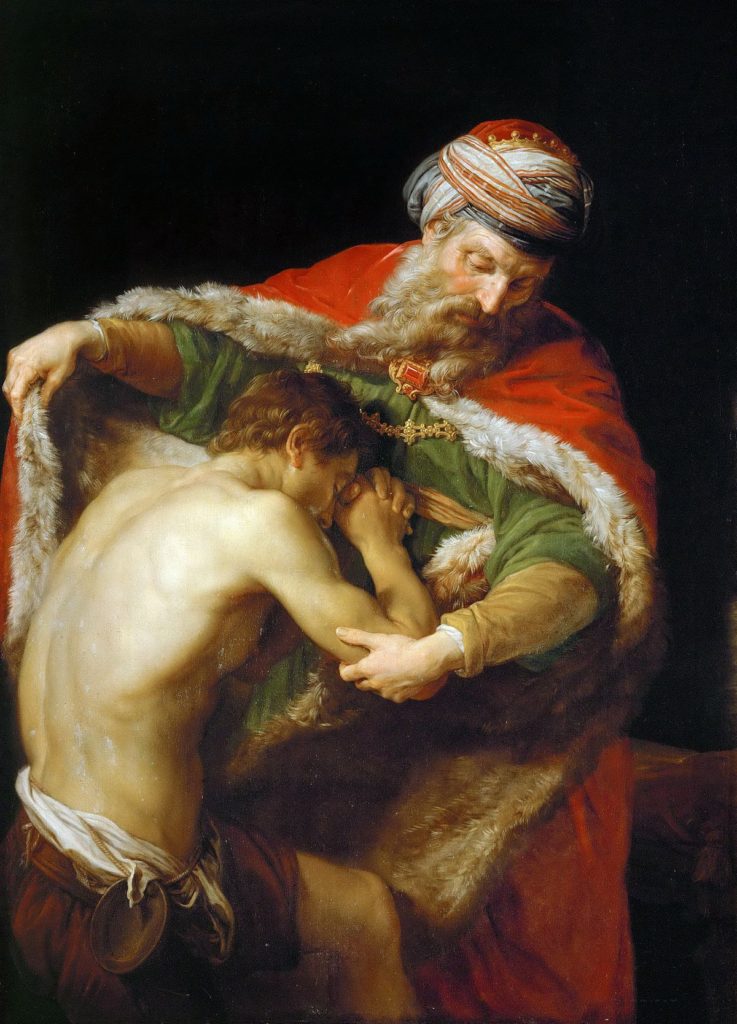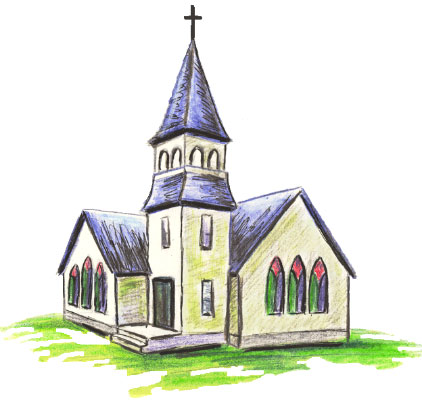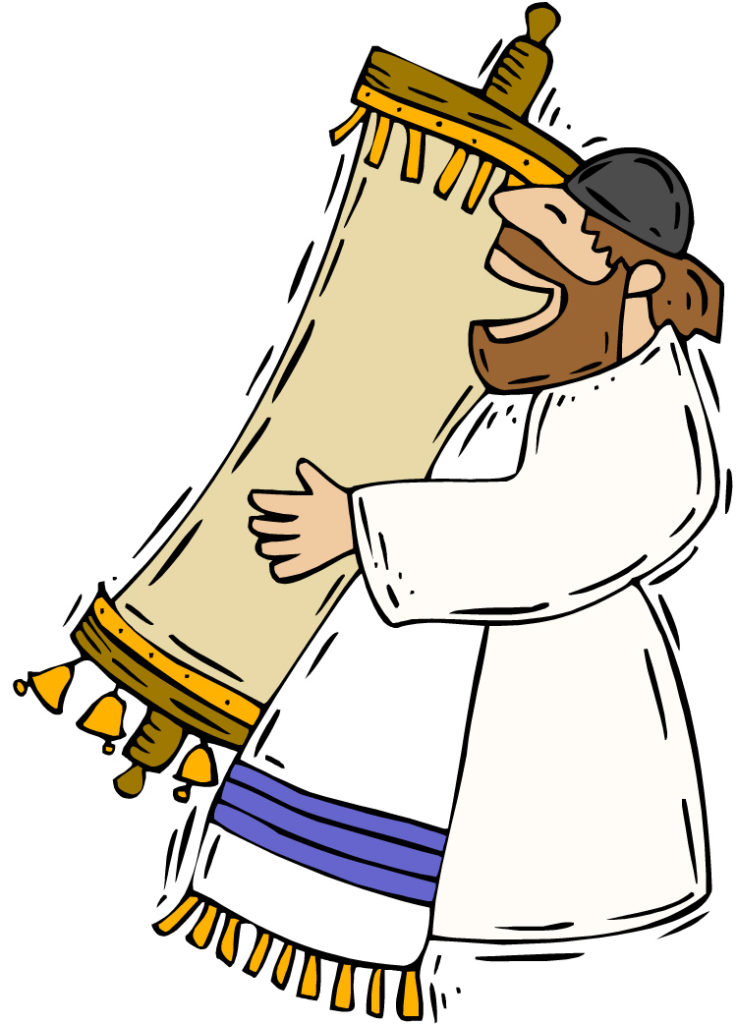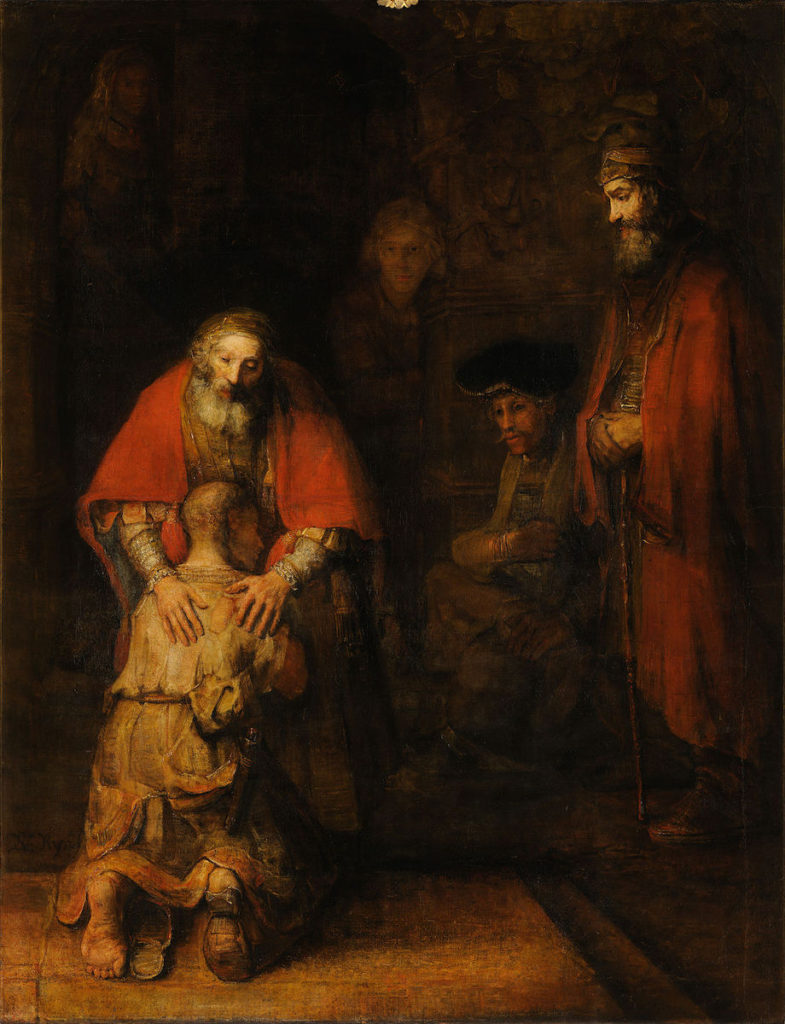
Luke 15:11–32
In this parable, a certain man had two sons the youngest of which requested his share of the inheritance of his father’s estate. The young man took his inheritance from his father and left home to journey into a far country where he wasted it on riotous living. A famine broke out and the penniless and hungry son joined (literally, glued, joined tightly) himself to a citizen of that country as a servant. His new master then sent him into the fields to feed husks to the swine. Conditions were so bad for the son and his hunger so acute that he desired to eat the swine’s food. Out of desperation and in realization of his sinful condition, the young man determined to return to his father’s house, willing no longer worthy to be received as a son, but to be received only a hired servant. His father spotted him a great way off, had compassion on him, ran to greet him and fell on his neck and kissed him where upon the son confessed to his father that he had sinned against heaven and that he was no longer worthy to be called a son. The father, out of joy, dressed his son in the finest robe, put a ring on his finger and shoes on his feet. The father had the fatted calf killed and merriment was made over the return of the prodigal. To the father, the son was dead, but was now alive, was lost and was now found. Feasting ensued with music and dancing. When the elder brother heard the feasting and found out about the return of his younger brother, he was angry and refused to participate in the celebration. The father pleaded with him to join the feast. The jealous older brother stated that he had faithfully served the father during the intervening years and that a feast had never been made for him, but that the younger son who had wasted his inheritance on harlots and riotous living was now receiving royal treatment. The father replied that the elder son had no reason to be angry since he had always been with the father enjoying the rights and privileges of that position and that it was only proper to celebrate the return of the prodigal brother who had been “dead” and was “alive” again, had been lost and was now found.
Prophetic Points to Analyze:
- verse 11— two sons
- verse 13— far country
- verse 13— riotous living
- verse 15— joined himself to a citizen of that country
- verse 15— feed husks to the swine
- verse 16— desired to fill his belly with the husks that the swine did eat
- verse 18— return to my father
- verse 22— best robe
- verse 24— he was lost, and is found
- verse 25— elder son
- verse 27— your younger brother
- verse 30— wasted his inheritance with harlots
- verse 32— was dead and is alive again
- verse 32— was lost and is found
This parable, in a nutshell, outlines much of the history of Israel up to the end time final redemption. This is a parable that is a genre of ancient Jewish literature called aggadah. The purpose of aggadic literature was not to establish line-by-line dogma, doctrine or theological truth, but was a means to teach general moral principles in story form. We will discuss this at greater length latter in our treatment of the Parable of Lazarus and the Rich Man in Luke 16.
So what was Yeshua teaching prophetically in this parable? Let’s analyze the pertinent details.
The father in the story represents YHVH Elohim our heavenly Father. The two sons symbolically represent the two houses of Israel: the house of Judah or the Jews (descended from Judah as represented by the older brother) and the house of Israel or the Christians (as represented by Ephraim the son of Joseph who was the younger brother to Judah among the twelve sons of the patriarch Jacob).
The inheritance that YHVH, the Father, had for his two sons (the houses of Judah and Ephraim), among other things, was that they were to become a great nation and a source of spiritual light to the nations of the world (Deut 4:6–8). They were to inherit the promises made to the patriarchs under the Abrahamic Covenant. All the blessings mentioned in Deuteronomy 28 were to be theirs. From this great nation would ultimately come the Messiah who would redeem the world and bring many peoples of the nations into the commonwealth or family of Israel (Eph 2:11–13). These would become sons and daughters to Abraham through faith in Yeshua (Gal 3:28–29; Rom 4:16; 9:8–11), and would inherit eternal life and become members of his eternal kingdom. Paul talks about this in Romans, Ephesians and Galatians. It is not in the scope of this work to address all these issues in detail, but references are made to this throughout the body of this work.
In this parable, the younger son assumes his rights, takes his inheritance, leaves his father’s house and squanders it away on riotous living in a far country. This represents the Northern Kingdom leaving Elohim, the Torah, the covenants of Israel, and falling into paganism. This occurred immediately after the Northern Kingdom split from the commonwealth of Israel under King Jeroboam. In this parable, the younger son spent time pursuing women. There are numerous prophetic warnings and rebukes in the Tanakh that speak of the adulteries and whoredoms of the Northern Kingdom (as well as the Southern Kingdom). Whole chapters in the prophets are devoted to this subject.
The far150 country speaks to Israel’s captivity and exile into a foreign land as a result of her wickedness. Israel, like the son in the parable, literally joined or glued herself to her foreign lovers where she mixed herself with the nations physically and spiritually. Not only was Israel scattered among the heathen nations, but she became assimilated into them as well.
With his inheritance spent and with the pains of famine gripping the son, he soon found himself literally in slavery or captivity feeding a foreigner’s swine. He realized that he was no better than the pigs that were eating while he was starving. Isaiah speaks of YHVH’s people going into captivity and becoming famished and dried up with thirst. Such a state of being was no better than the grave itself (Isa 5:13–15).
The son became as one of the beasts of the field.He lived with the swine, fed the swine and probably ate swine as well, something that is contrary to the Torah’s dietary laws (see Lev 11), and a practice considered to be an abominations in YHVH’s eyes (Isa 65:4; 66:17), but a practice that most Christians relish and celebrate (especially on their pagan holidays of Christmas and Easter) as an example of their “freedom” from the constraints of the Torah!
In that sad state of affairs, reality came knocking on the door of the prodigal’s life. The wine, women and song grew old, for the proverbial grass was not greener on the other side of the fence. The younger son soon found himself out of money and starving to death and living with the pigs. He began to long for the good life back in his father’s house.
Long ago, Hosea prophesied that Israel (in part a prophetic reference to Christians) “will follow after her lovers, but she shall not overtake them; and she shall seek them, but shall not find them. Then shall she say, ‘I will go and return to my first husband, for then was it better with me than now.’ For she did not know that I gave her corn and wine and oil and multiplied her silver and gold…” (Hos 2:7–8). The younger son in Yeshua’s parable is a picture of this prophecy. He is a picture of believers in the Christian church who have largely exchanged the truth of the Torah (YHVH’s instructions in righteousness) for pagan traditions and man-invented humanistic theologies that make of non effect the Word of Elohim (Mark 7:9, 13).
In a state of physical and spiritual despair, the prodigal son returns to his father’s house in a very humble and repentant state. His father greets him with open arms, places a robe on him, and kills the fatted calf in his honor.

Prophetically, has this event occurred yet? Has apostate Israel (the Christian church) returned to YHVH? The Jewish sages teach that this will happen at the end of the age prior to the coming of Messiah at the establishment of his millennial kingdom—an event known as the “regathering of the exiles” of the “lost ten tribes of Israel” and which is part of the final redemption. (See Part 3 of this book where we discuss the return of the lost sheep of the house of Israel in more detail. ) And indeed, the return or regathering of the scattered sheep of the lost Israel is prophesied in the Scriptures. This process started at Yeshua’s first advent and will continue at his second coming and on into the Millennium. YHVH says that his people, the house of Israel, when they turned from him, ceased being a people and were “not a people”or “not my people,”156 but that they would eventually become “a people” of YHVH once again (Hos 2:23).
In Isaiah 11:10–13 we read that Yeshua, the Root of Jesse, will recover the remnant of his people from Assyria (where the Northern Kingdom was taken captive) and “shall assemble the outcasts of Israel, and gather together the dispersed of Judah from the four corners of the earth. The envy [jealousy, or passion] also of Ephraim shall depart, and the adversaries of Judah shall be cut off. Ephraim shall not envy [be jealous of] Judah and Judah shall not vex [bind, cause distress to] Ephraim.”
This unique prophetic passage gives us some insight into the sibling rivalry between the two houses of Israel. We see this same rivalry between the older son and the younger son in Yeshua’s parable we are now analyzing. Paul likewise cautions the Gentiles (or people of the nations) who are presently being brought into the commonwealth of Israel through Messiah Yeshua (Eph 2:11–19), and being grafted into the olive tree of Israel, against acting pridefully toward the roots of that tree that support and nourish them. Just because they, through the mercies and grace of YHVH, have been granted equal status with their Jewish brothers (Rom 11:18, 13–25 for context) does not give them boasting rights.
Batya Wootten in her book Israel Redeemed? has some profound observations concerning this parable. She also sees the prodigal as representing Ephraim, while the older brother, who stayed home to tend the farm, as representing Judah.
About the prodigal (Ephraim) being hungry while feeding the pigs, she sees this as a fulfillment of the prophecy in Amos 8:11, “‘Behold, the days are coming,’ says the Adonai YHVH, ‘That I will send a famine on the land, not a famine of bread, nor a thirst for water, but of hearing the words of YHVH.’” In most churches in Christianity, not only is the Torah and the Word of YHVH not being preached in a substantial or meaty manner, but neither are many hearing, doing or obeying the Word of YHVH, which is the meaning the word “hearing” in Amos 8:11. “Today, Ephraim feels he is wasting away in gatherings that offer only the elementary milk of the Word when he needs the filling protein of meat. He craves the excitement of doing the Father’s will (John 4:34)” (Wootten, pp. 129–130).

Wootten also sees parallels between the prodigal’s and the church’s involvement with pigs. She notes, “Being close to pigs describes the younger Ephraim, not Judah. Judah does not touch pork, while Ephraim celebrates his supposed “freedom” by eating pork and Easter hams. Although he has been out wallowing in the mire, Ephraim will repent and return home, and the Father will welcome him” (ibid). While feeding the pigs, the prodigal came to his senses and began to repent of his youthful sins. At the same time our Heavenly Father says, “I have surely heard Ephraim grieving,” to which repentant Ephraim cries, “‘Thou hast chastised me, and I was chastised, like an untrained calf; bring me back that I may be restored, for Thou art YHVH my Elohim. For after I turned back, repented; after I was instructed, I smote on my thigh; I was ashamed, and humiliated, because I bore the reproach of my youth” (Jer 31:18–19). Simultaneously, the father of the prodigal yearned for his son as our Heavenly Father says, “Is Ephraim my dear son? Is he a delightful child? Indeed, as often as I have spoken against him, I certainly still remember him; therefore my heart yearns for him; I will surely have mercy on him” (Jer 31:19–20; ibid., p. 130).
“When the prodigal returned, the older son was not pleased with his reappearance. He was even angry. Like the older son, first century Jewish leaders were not happy about the return of those once lost among the nations. They accused Paul of bringing Greeks into their temple and thus defiling their holy place. Some were even angry enough to kill (Acts 21:27–31). Sadly, they walked in the same spirit as some of their fathers: ‘The inhabitants of Jerusalem…said [of scattered Ephraim], “Go far from YHVH; this land has been given us as a possession”’ (Ezek 11:15). Today, some Jewish believers are likewise unhappy about Ephraim’s reemergence; they reject the idea that the non-Jews might be equal heirs in Israel. Some even want non-Jewish believers to be in their synagogues for the wrong reasons, thus Paul says of such types, ‘They make much of you, but for no good purpose; they want to exclude you, so that you may make much of them’ (Gal 4:17, NRSV). In other words, they want to appear superior, so that you might look to them for acceptance” (ibid., pp. 130–131).

Lest some feel that Judaism is the expression of the Father’s will for his people, and that somehow the Parable of the Prodigal Son teaches that believers must return to Judaism. Wootten then draws our attention to an important point in this parable that is easily overlooked. She says, Those who feel jealous of Judah need to see that the prodigal was in the house, making merry with his father, but that the older son was outside, in the field. In the Parable of the Wheat and the Tares, Yeshua says, “The field is the world.” The older son was not inside the father’s house, but was approaching it, or drawing nigh (Matt 13:38). Those who feel jealous also need to see that the father’s love for his older son was so great that it compelled him to go outside to meet with him, even to plead with him. Such is the Father’s heart toward Judah (the modern, non-believing religious Jews). He has sworn concerning this beloved one, “YHVH will possess Judah as His portion in the holy land, and will again choose Jerusalem” (Zech 2:12). Abba wants brother Judah to join the party, and he wants Ephraim to behave in a way that makes him want the same (ibid., p. 131).
What provoked the older brother to want to join in the feasting in the father’s house? Wootten observes that the older brother was provoked because his younger brother was in the house with the father, celebrating, rejoicing and making merry. This teaches us that legalism and religion will not provoke Judah to jealousy, but celebration will. According to Wootten, having others see us in a joyous frame of mind might even be said to be Abba’s plan of evangelism. When people see that our relationship with Messiah Yeshua makes us glad and causes us to rejoice, they will want to join in. Celebration is one of the secrets to our reunion, which is perhaps why so many non-Jews now feel an overwhelming urge to celebrate the feasts of Israel. In our rejoicing, we need to take a fresh look at these prophetic times. We need to see the many ways in which they rehearse and foretell the Father’s plan of salvation for His people, and the many ways in which they speak of the redeeming work of Messiah Yeshua (ibid., pp. 131–132).
What You Can Do
In order for us to be fishers of men fishing for the lost sheep of the house of Israel, we must possess a deep love not only for the Christian sheep of Israel, but for the Jewish sheep of Israel as well. Besides this, we must learn to be breach repairers (Isa 58:12), and joiners of the two stick or trees of Israel (Ezek 37:15–28).
If you don’t have it already, pray that the Father will give you a deep love for our Jewish brethren and for the land of Israel. Pray that you will receive an empathy and understanding of the Jewish heart and religious system. YHVH is not calling his saints to go into rabbinic Judaism, but by understanding it, we will be able to reach out to our Jewish brothers in love and wisdom.



Your messages are always spot on, wow!! Love to read them and see where my heart is at to understand what I need to do to share with all the Love of our LORD G-d among all mankind. You are surly a prophet of old, sharing with us the thoughts and wishes of our G-d for the good of all mankind. Bless you!!
I read your messages and pass them on to my pastor and a number of my friends. The ARC of David is alive in this place. And Oh, does it speak!!!
Interesting analogy I’ve not considered before, but makes sense as the wild olive branch will be grafted back into the vine. So all Israel will be saved!
Christmas Ham not Easter Ham.
Jews,by the way,love to feasts (or eats).
Don’t know about where you live, but Easter ham is also a tradition in America. With all due love and respect, please let us not argue over such small details. Blessings!
Oh how I love it when we delve into the word and get all the meat off the bone-that’s feasting. Today was International Holocaust Remembrance Day-on this day I call of email the local synagogue just to let them know we are standing with them 🙂
That’s interesting. What kind of response did you get?
favorable-they were floored!
There is no need for jealousy in Elohim’s household; every one will be rewarded in regard to what they have done here on the earth. Some people are delighting in the opportunity to be martyrs for Elohim/Yeshua, while others are continually grumbling because they don’t have everything they crave. Thanks to Elohim/Yeshua, we are eligible for eternal life with our Creator even though, we don’t deserve it. Whoever desires more eternal rewards just needs to do more service for the Lord in the here and now. Period.
Shalom, Sonja